As the competition for jobs reaches fever pitch, the need for in-depth background checks has never been higher. Background check statistics make for alarming reading both in a corporate and personal context, as maintaining strict protocols to ensure the safety of companies and people should be of paramount importance. Read on for the details!
Background Check Stats (The Highlights)
- The background check services market in the US is estimated at $4.3 billion in 2023.
- It’s estimated that 22% of gun owners in the US have acquired their most recent firearm without background screening.
- 73% of Americans strongly support requiring background checks on all gun sales.
- 8,050,616 NICS firearm background checks were conducted in Q3 2023 alone.
- 63% of fingerprints processed against state criminal history record systems are for noncriminal justice purposes, such as employment.
- 95% of organizations in the US conduct employment background checks.
- 25% of job seekers have dropped out or considered dropping out of a hiring process due to issues with the background check.
- 18% of people have run a background check on their dates.
How big is the background screening market?
The background check services market in the US is estimated at $4.3 billion in 2023.
The above figure indicates a 1.3% growth compared to the year before and an increase at a CAGR of 2.1% in the five-year period between 2018 and 2023.
There are 1,268 background check companies in the US, employing 14,908 people.
The profit margin in the industry is estimated at 5.2%.
What are the biggest background check companies in the US?
The biggest background screening companies in the US are HireRight, First Advantage, and Sterling Check.
Headquartered in Tennessee, HireRight has an estimated 2,760 employees and holds 17.8% of the total background check industry revenue.
With an estimated 5,500 employees, First Advantage is headquartered in Georgia and accounts for 15.9% of the total revenue in the background screening industry.
Headquartered in New York, Sterling Check has an estimated 6,000 employees and holds 13.8% of the total background check industry revenue.
Processing fingerprints for noncriminal justice purposes is privatized in 35 US states.
In 21 of them, these types of background checks are handled by a single vendor.
In 33 of them, vendors charge a higher fee than the state.
83% of organizations agree that quality and accuracy are the most important factors when determining which background check company to partner with.
Speed ranks second, as agreed by 58% of organizations, followed by cost and customer service, with 54% and 43%, respectively.
Integration with ATS/HRIS in use is important to 15% of organizations, while only 2% say the same about peer adoption and feedback.
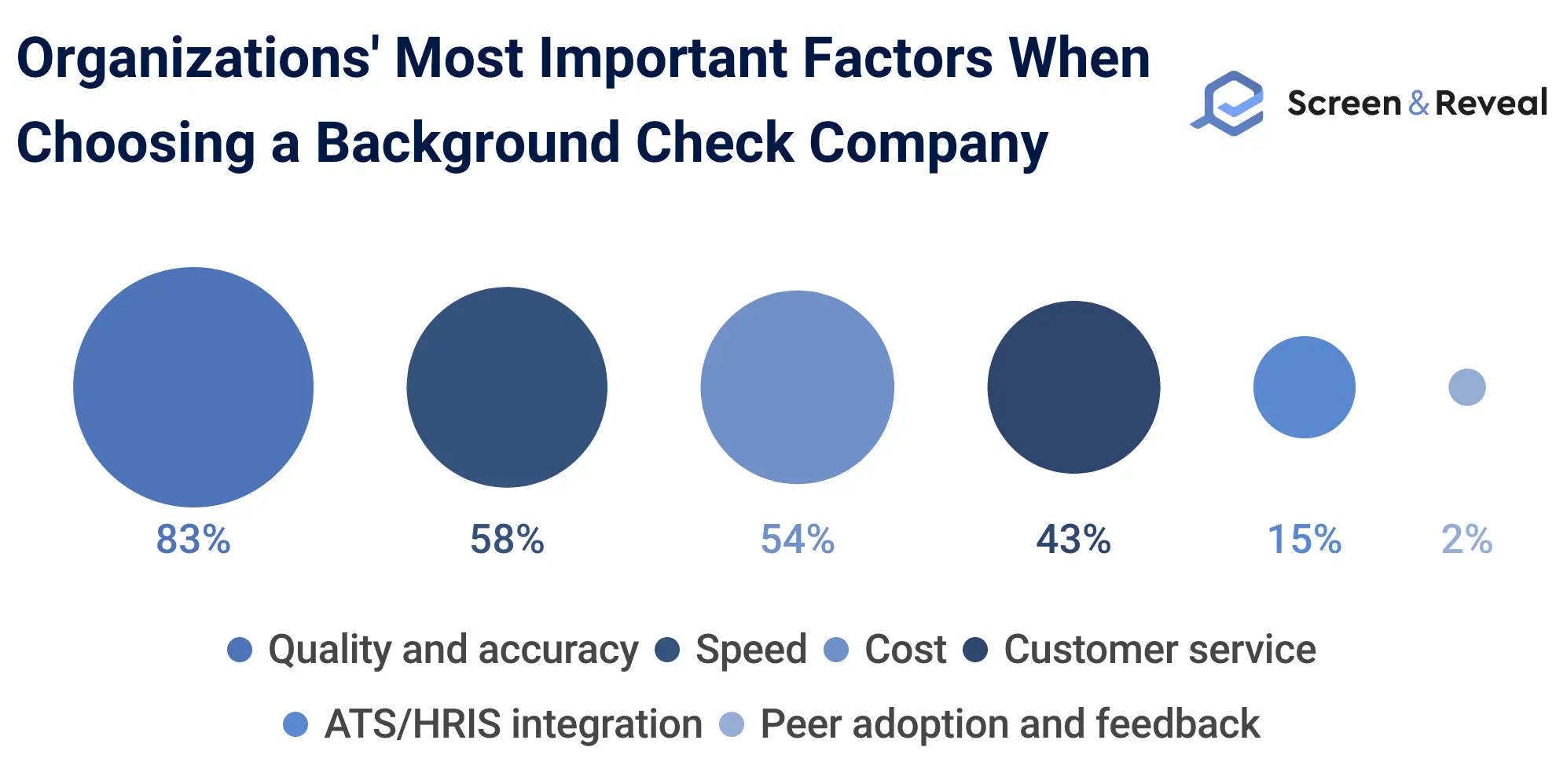
Gun Background Check Statistics
- It’s estimated that 22% of gun owners in the US have acquired their most recent firearm without background screening.
- 45% of gun owners in the US who have recently acquired a firearm online have done so without being subject to background screening.
- About 33% of firearm transfers are executed between private parties, and 50% of them occur without a background check. This figure drops to 26% in states with comprehensive background check laws.
- According to national firearm background check statistics, around two million firearm purchase applications have been denied as a result of an NICS background check between 1998 and 2022. With over one million cases, the most common reason was that the applicant was convicted of a crime punishable by more than one year or a misdemeanor punishable by more than two years.
Universal Background Check Statistics
- 73% of Americans strongly support requiring background checks on all gun sales. 15% are somewhat supportive, while equal 4% portions are somewhat and strongly against it. 5% have no opinion on the topic.
- 64% of Americans strongly support subjecting private gun sales and sales at gun shows to background checks. 17% are somewhat supportive, while 7% have no opinion on the topic. 6% are strongly against it, and 5% are somewhat against it.
- 21 US states and DC have background check requirements extended beyond federal law. 16 of them and DC require background checks for all gun sales.
- The US states with universal background checks requested at the points of sale at both licensed dealers and unlicensed sellers for all classes of firearms are: California, Colorado, Connecticut, Delaware, Maryland, Nevada, New Jersey, New Mexico, New York, Oregon, Rhode Island, Vermont, Virginia, Washington, and Washington DC.
- Beyond universal background checks, 12 states impose additional background check requirements at gun shows.
FBI Background Check Statistics
8,050,616 NICS firearm background checks were conducted in Q3 2023 alone.
Data on background checks by state reveals that, with 1,436,297, Illinois had the highest number of firearm background checks in the same period, followed by Kentucky, with 973,423.
Texas, Florida, and California round the list of the top five, with 423,789, 362,941, and 347,506 firearm background checks conducted in Q3 2023, respectively.
Number of NICS Firearm Background Checks by State
| State | Q1 2023 | 2022 |
|---|---|---|
| Alabama | 165,544 | 739,113 |
| Alaska | 17,916 | 84,802 |
| Arizona | 134,920 | 533,699 |
| Arkansas | 60,975 | 239,350 |
| California | 347,506 | 1,431,993 |
| Colorado | 142,178 | 528,335 |
| Connecticut | 63,063 | 230,702 |
| Delaware | 13,099 | 58,323 |
| DC | 4,272 | 16,102 |
| Florida | 362,941 | 1,474,730 |
| Georgia | 156,381 | 601,407 |
| Hawaii | 5,881 | 18,842 |
| Idaho | 59,450 | 235,465 |
| Illinois | 1,436,297 | 4,476,055 |
| Indiana | 218,809 | 1,105,040 |
| Iowa | 60,431 | 218,703 |
| Kansas | 49,266 | 191,895 |
| Kentucky | 973,423 | 4,016,510 |
| Louisiana | 77,980 | 344,808 |
| Maine | 26,981 | 114,090 |
| Maryland | 109,454 | 326,114 |
| Massachusetts | 61,950 | 227,928 |
| Michigan | 215,639 | 789,160 |
| Minnesota | 222,101 | 891,044 |
| Mississippi | 69,757 | 284,864 |
| Missouri | 134,560 | 530,932 |
| Montana | 33,255 | 141,803 |
| Nebraska | 21,973 | 75,084 |
| Nevada | 35,609 | 152,261 |
| New Hampshire | 33,667 | 133,507 |
| New Jersey | 46,800 | 167,740 |
| New Mexico | 44,976 | 173,793 |
| New York | 102,345 | 447,567 |
| North Carolina | 175,795 | 612,695 |
| North Dakota | 17,510 | 72,458 |
| Ohio | 173,175 | 656,936 |
| Oklahoma | 92,905 | 370,275 |
| Oregon | 158,569 | 495,842 |
| Pennsylvania | 328,603 | 1,229,129 |
| Rhode Island | 6,970 | 27,900 |
| South Carolina | 95,637 | 423,098 |
| South Dakota | 19,810 | 87,589 |
| Tennessee | 206,283 | 836,953 |
| Texas | 423,789 | 1,732,651 |
| Utah | 240,675 | 1,014,277 |
| Vermont | 11,668 | 44,722 |
| Virginia | 143,716 | 567,504 |
| Washington | 212,395 | 706,260 |
| West Virginia | 52,705 | 192,868 |
| Wisconsin | 165,163 | 635,528 |
| Wyoming | 15,849 | 70,276 |
30,778,722 NICS firearm background checks were conducted in 2022.
The above figure indicates a 20% decrease compared to the year before.
NICS background check data reveals that the number of firearm background checks in the US peaked in 2020, at 39,695,315, marking a near 40% increase compared to the year before.
The states with the highest number of background checks for guns conducted in 2022 were:
- Illinois – 4,476,055
- Kentucky – 4,016,510
- Texas – 1,732,651
- Florida – 1,474,730
- California – 1,431,993
- Pennsylvania – 1,229,129
- Indiana – 1,105,040
- Utah – 1,014,277
NICS background checks are accurate 99.3%-99.8% of the time.
They are also resolved immediately in at least 90% of cases, and take an average of 107 seconds to process.
Employment Background Check Statistics – Companies’ Views
63% of fingerprints processed against state criminal history record systems are for noncriminal justice purposes, such as employment.
Only nine states don’t retain any fingerprints processed as part of conducting these types of background checks.
95% of organizations in the US conduct employment background checks.
Additionally, 77% have a documented background check policy.
These figures compare to 79% of organizations outside of the US that conduct employment background screening and 63% that follow a documented policy.
As agreed by 77% of US organizations, protecting employees and customers is the primary reason for conducting background checks.
Background screening stats reveal that improving the quality of hires ranks second, with 51%, followed by protecting the company’s reputation, with 40%.
For organizations outside of the US, improving the quality of hires ranks first, as agreed by 61% of them. Protecting employees and customers ranks second, with 56%, followed by protecting the company’s reputation, with 53%.
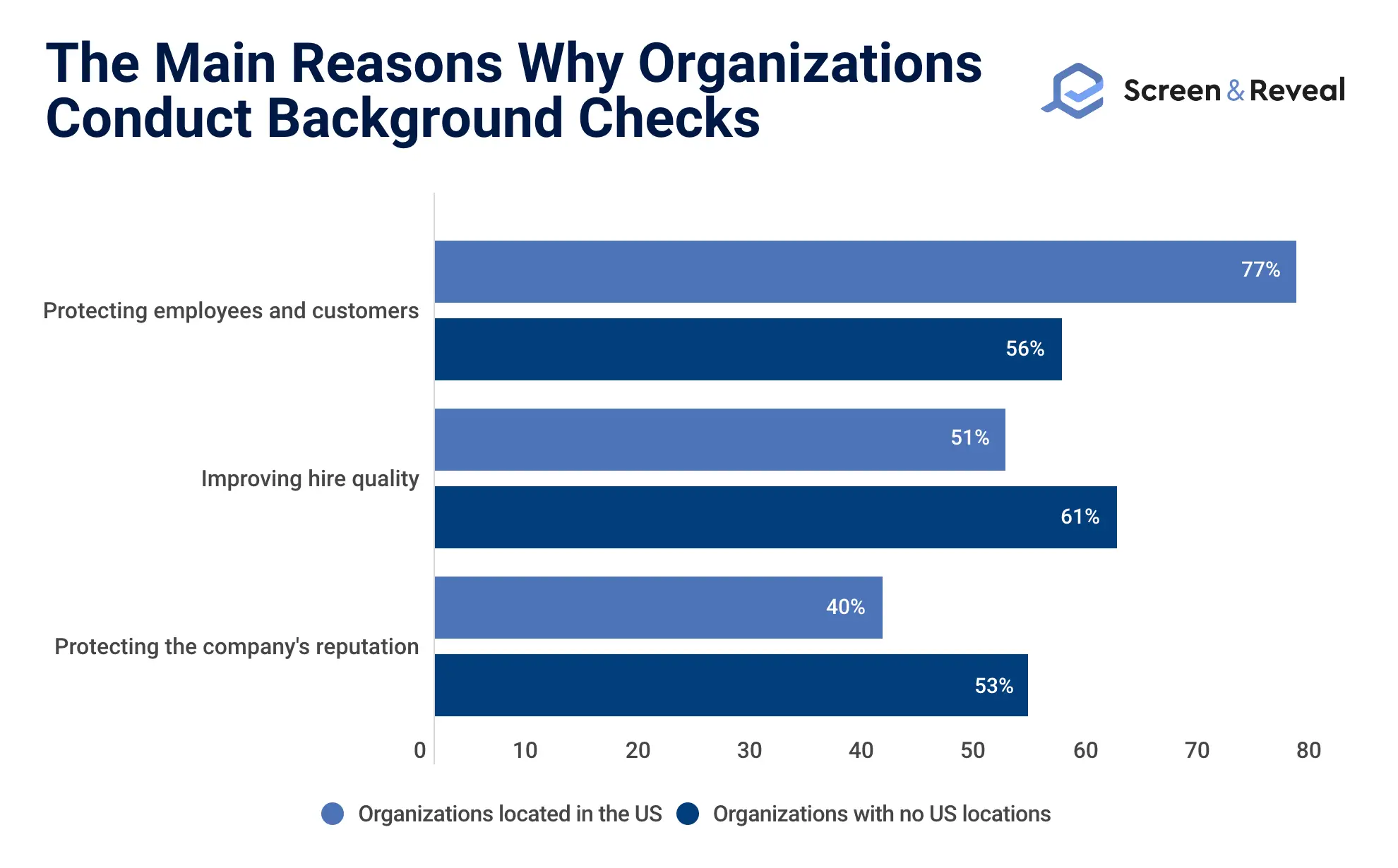
63% of HR professionals conduct background checks for all workers, regardless of type.
32% do so for traditional employees only, like full-time ones, while 3% don’t know which types of employees their organization conducts background checks for.
2% of HR professionals say that running a background check for an employee depends on the nature of their work; e.g. they run background checks on high-level employees only, those who will be handling sensitive information, or office workers but not field workers.
99% of organizations in the US that conduct background checks do so for some or all of their full-time employees.
According to background screening statistics, 95% do so for their part-time employees, 62% for contract workers, 45% for volunteer workers, and 17% conduct background checks for some or all vendor representatives.
While they’re a tad behind when it comes to full-time and part-time workers, organizations located outside of the US seem to be more careful around contract and volunteer workers, and a much higher portion of them conducts background checks on vendor representatives.
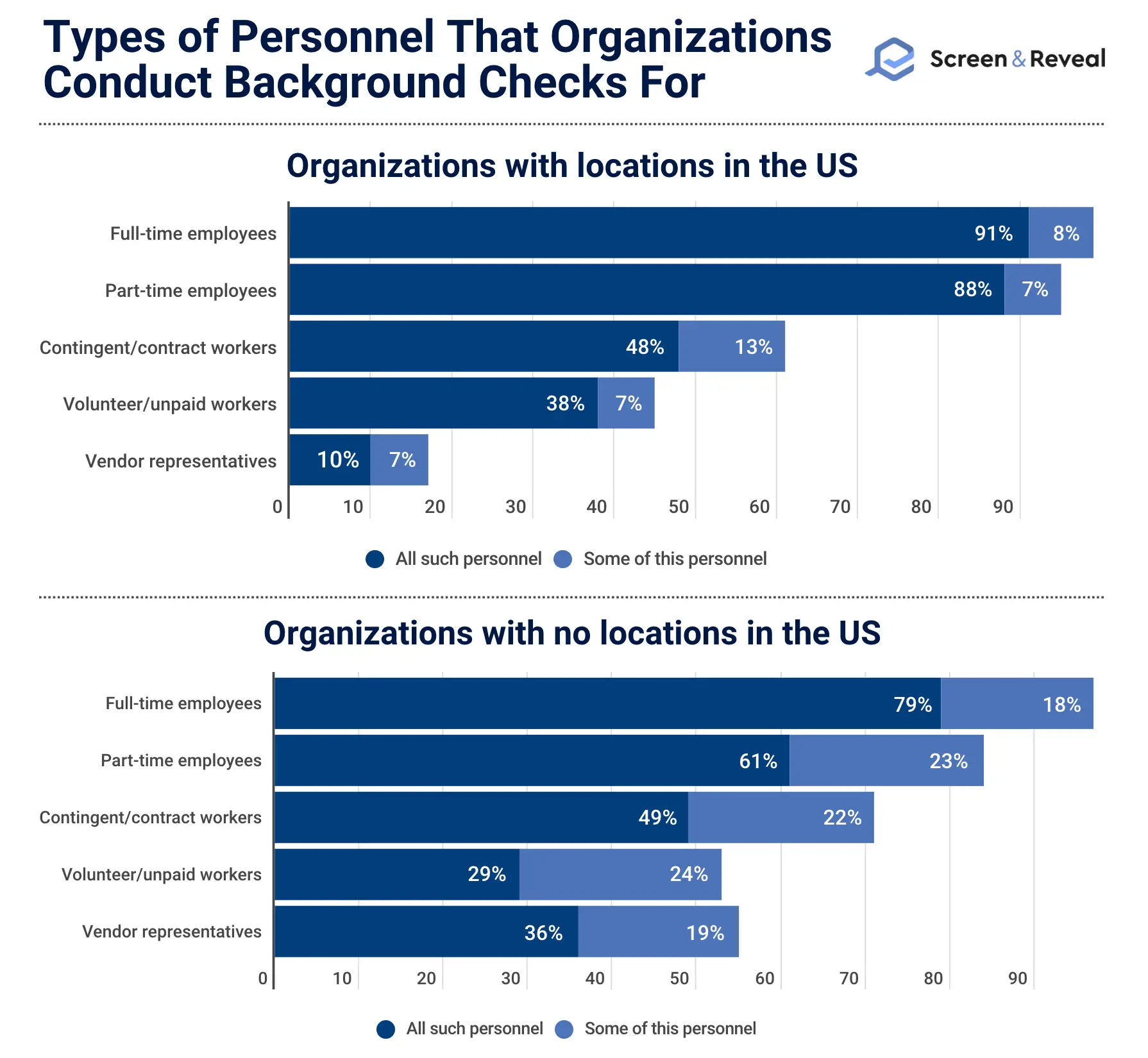
74% of organizations in the US that conduct background checks do so after a conditional offer.
This compares to the 30% of organizations with locations outside of the US which conduct background checks at this stage. Instead, the majority of them, or 42%, conduct background checks between interviews and making an offer. This is the case for only 16% of companies located in the US.
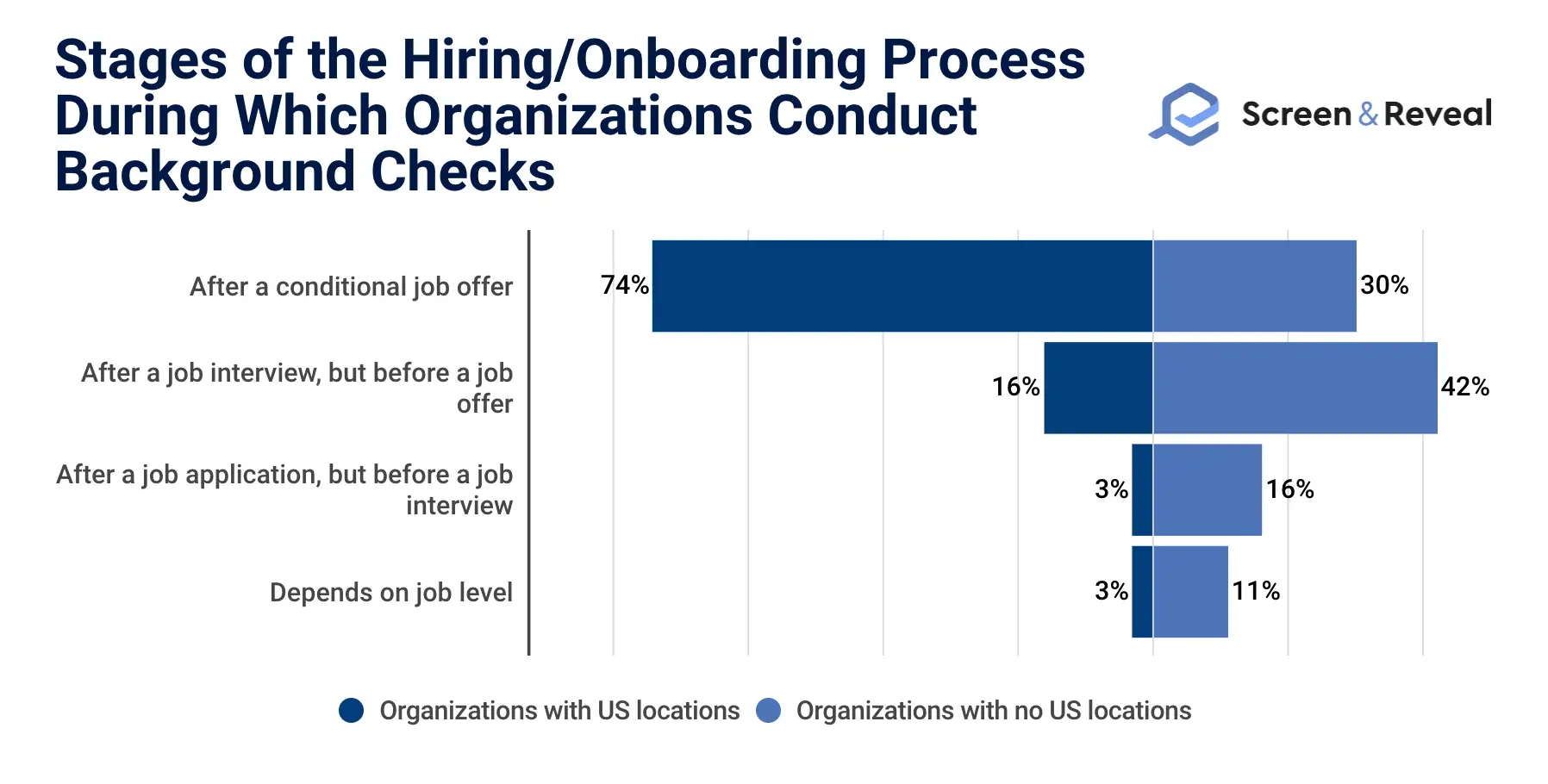
94% of organizations in the US that conduct background checks, conduct criminal background checks.
Employment background check statistics reveal that 75% conduct noncriminal background checks.
The respective figures among organizations located outside the US are 75% and 79%.
If a criminal background check returns a flagged activity or consideration, 65% of HR professionals allow the candidate to respond, send a pre-adverse, or an adverse action notice.
45% conduct individual assessment and 38% consult their background check partner or provider.
However, 21% will automatically eliminate the candidate from consideration, which is what the Ban the Box movement is trying to prevent.
81% of organizations in the US incorporate identity checks in their background screening.
The corresponding figure for organizations with locations outside of the US is 87%, which are also more likely to implement employment verification, at 88% compared to 72% of organizations in the US.
According to background check statistics, at 87% vs 64%, organizations located outside the US are also more likely to incorporate education verification services in their background checks.
Organizations with locations in the US are more likely to implement sex offender registry and driving records checks, as well as alcohol and drug screening,
On the other hand, organizations outside of the US are much more likely to incorporate social media checks, as well as professional credit screening and license verification services.
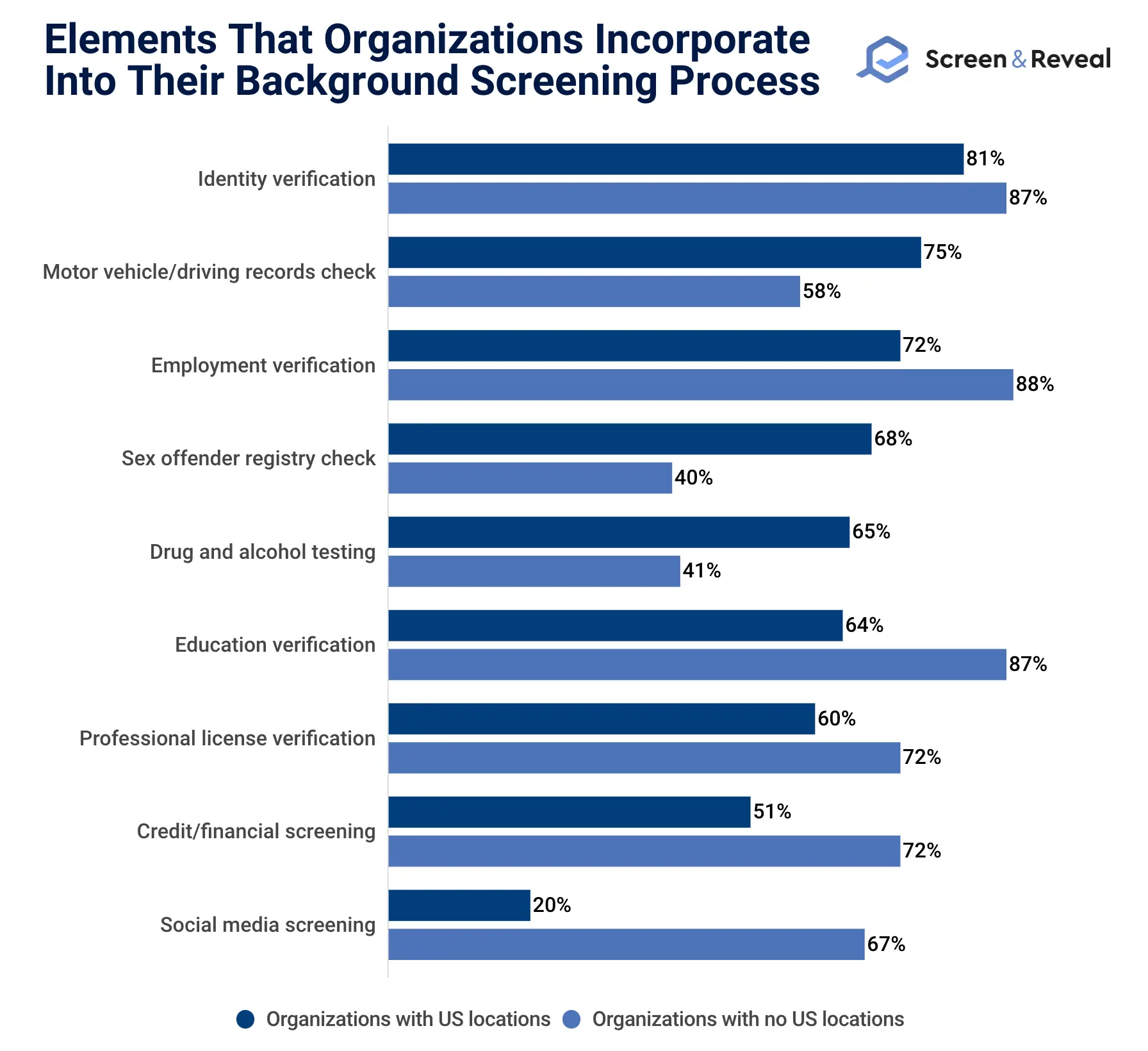
67% of organizations in the US that conduct ongoing background screening, conduct criminal background checks.
The corresponding figure for organizations with locations outside of the US is 72%.
Driving record checks and drug testing are more common in the US, while organizations located outside the US are more likely to conduct social media and credit screening services.
License monitoring and healthcare sanctions have a similar usage trend when it comes to organizations that conduct ongoing background screening stateside and abroad.
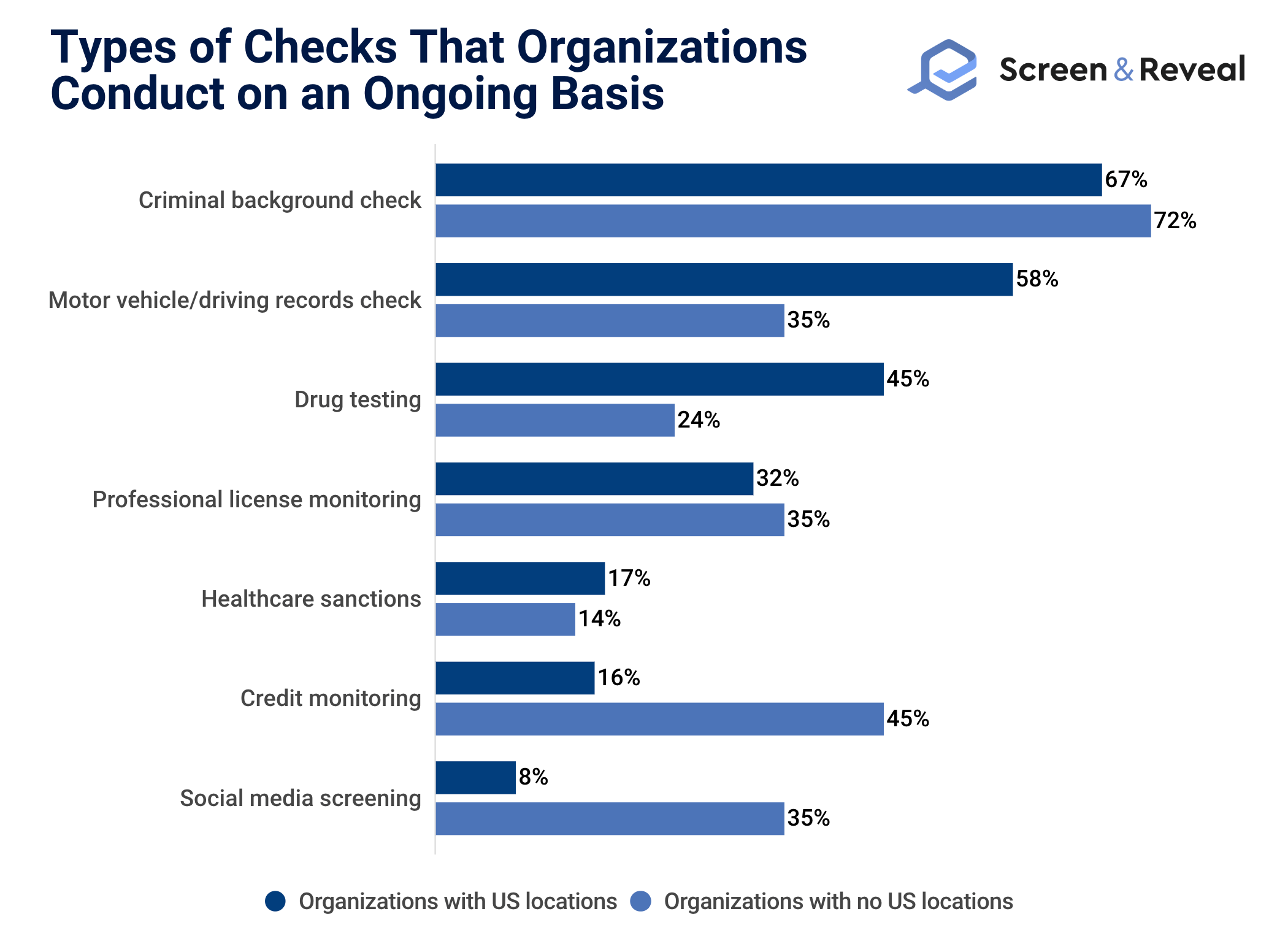
62% of HR professionals say their organizations have made changes to their background check process to cater to the shift to remote and contingent work.
Background check statistics reveal that 33% of organizations haven’t made changes in this regard, while 5% of HR professionals don’t know whether such changes have been introduced or not.
72% of organizations agree that it’s important for companies to have access to global/international background check capabilities.
Another 33% agree that they expect to hire more candidates who live or have lived outside of the organizations’ current locations in the coming years.
88% of HR professionals expect the background check process at their organization to change in the few years to come.
Of them, 47% expect it to become more thorough, and 38% expect significant changes.
Another 28% expect the background check process to become more streamlined, 20% expect it to become more automated, and 16% expect it to become more integrated within the hiring process.
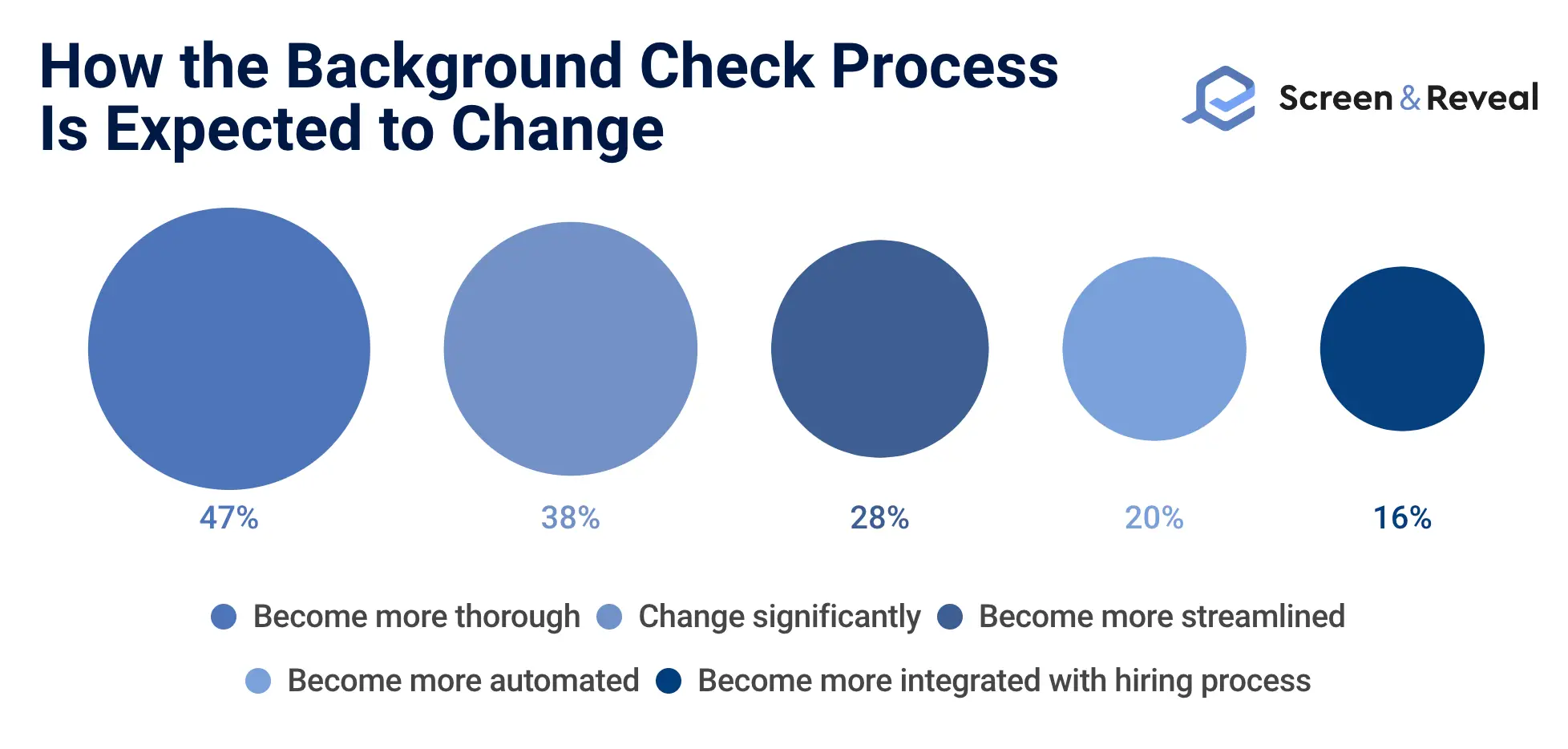
50% of HR professionals somewhat agree that their organizations are planning to or making the right changes to their background check process.
According to background screening stats, 36% strongly agree, while respective 10% and 2% somewhat and strongly disagree. 3% of HR professionals don’t know whether their organizations are planning to or making the right changes to their background check process.
52% of HR professionals expect that their organizations will add more services to make background checks more thorough in the next few years.
40% expect that they will be screening more types of workers than they do now, and 35% expect that they will increase technology use to improve efficiency and outcomes.
18% of HR professionals expect that they will increase ongoing background checks for current employees, closely followed by 17% who expect that they will increase the number of criminal background checks, while 10% expect that they will decrease the amount of criminal background screening.
9% expect that they will eliminate marijuana testing.
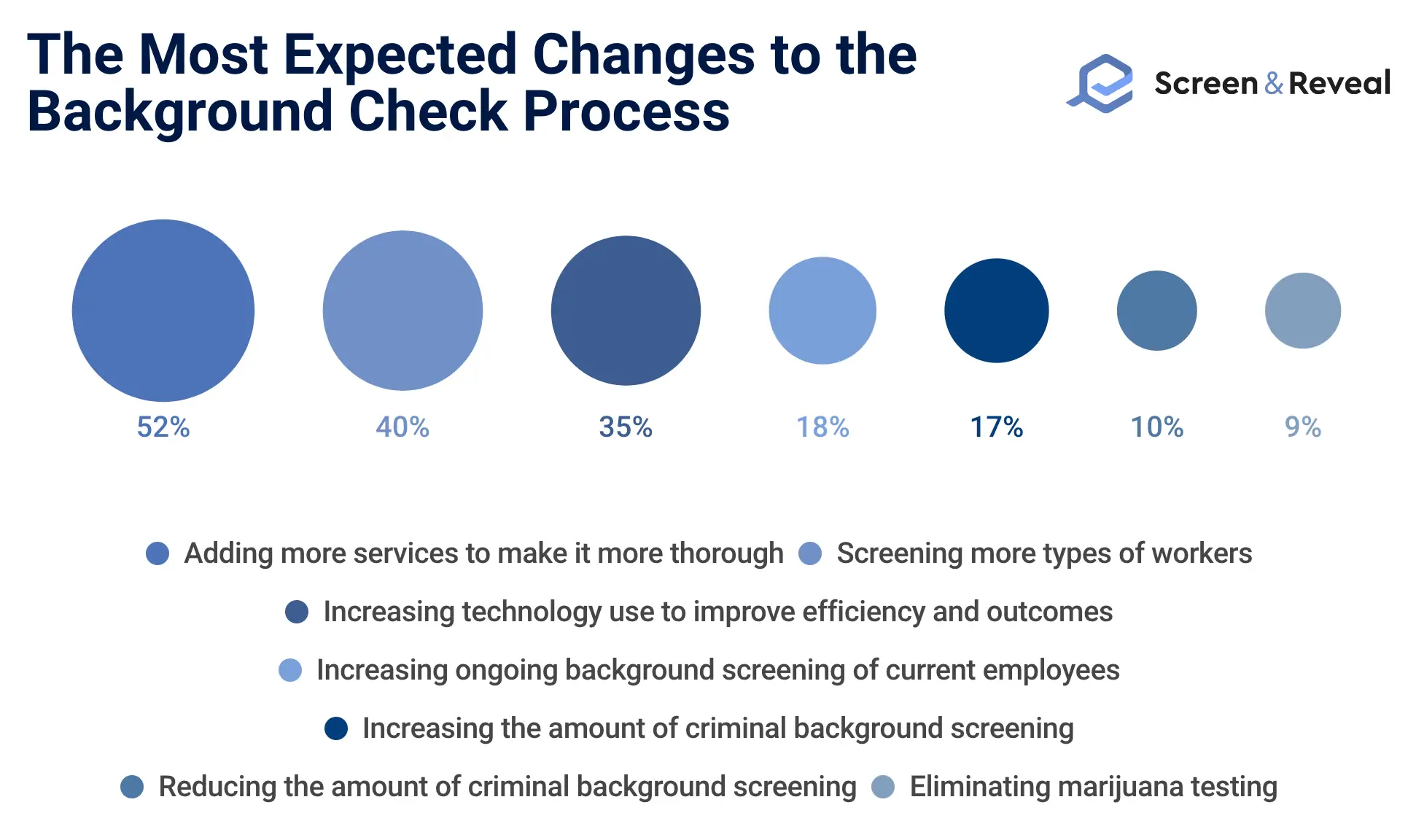
66% of HR professionals who expect adding more services to make background checks more thorough in the few years to come plan to implement identity verification.
Background screening statistics reveal that 45% plan to implement social media background screening, and 44% plan to implement health and drug screening.
Interestingly, respective 47% and 46% of HR professionals still plan to implement COVID-19 vaccine record checks and testing.
27% plan to implement workforce monitoring, 26% plan to implement motor vehicle record screening, and 25% plan to implement credit screening services.
14% of organizations in the US that conduct background checks plan to incorporate social media in the process.
Social media also ranks on top of what organizations located outside of the US plan to incorporate, however, at a much higher rate of 36%.
Employment verification ranks second among both types of organizations.
Sex offender registry checks rank third when it comes to organizations with US locations, while it’s among the bottom three things that organizations located outside of the US plan to incorporate.
Instead, organizations with locations outside of the US are considering implementing education verification in third place, followed by SSN tracing/identity checks, which is among the lowest-ranking choices when it comes to organizations located in the US.
96% of HR professionals incorporate identity verification in their work.
According to background check stats, 44% do so as part of the background check process, and 39% during the interview process.
9% of HR professionals conduct identity verification after candidates are hired, while 4% do so when the worker actually begins work.
3% don’t conduct identity verification, and 1% don’t know whether their organization incorporates identity verification or not.
53% of HR professionals are very confident in their identity verification process.
42% say they’re somewhat confident, while respective 5% and 1% are somewhat and very uncertain.
36% of HR professionals invest in background screening and identity verification.
Integrating the above into the hiring workflow to create a more seamless experience is the third most common investment that HR professionals make at their organizations.
At 49%, technology to enhance and simplify candidate experience ranks first, followed by technology to further automate the process, at 40%.
Job Background Check Statistics – Job Seekers’ Views
25% of job seekers have dropped out or considered dropping out of a hiring process due to issues with the background check.
The above is the fourth most common reason why job seekers drop out of a hiring process or consider doing so.
At 39%, the process taking too long ranks first, followed by the process being too complicated, at 37%, and the process involving too many touchpoints, at 27%.
78% of job seekers agree that communication and proactive updates are important aspects of the background check process.
Job seekers also state that the alignment of the background check process with the organization’s culture and values is the most important, but HR professionals consider it the least important.
Instead, HR professionals think speed and/or quick turnaround is the most important to job seekers, while they, in turn, find it very important.
The seamless integration of background checks with the rest of the hiring process is somewhat important to job seekers, but very important to HR professionals, while both parties agree that a mobile-friendly interface is not very important.
When it comes to background checks, background check facts reveal that 24/7 support is the least important to job seekers, but HR professionals find it somewhat important.
59% of job seekers agree that the background check process can make them more confident about the organization or pursuing the position they apply for.
25% agree it can make them less confident, while 16% of job seekers agree that the background check process has no effect on their confidence about the organization or pursuing the position they apply for.
72.8% of job seekers describe their latest background check experience as positive.
Of them, 27% describe it as good, and 23% as easy.
Job background check statistics reveal that 18.8% of job seekers describe their latest background check experience as negative.
Of them, 36% found it long, 16.7% describe it as hard, and 14.1% as complicated.
8.3% of job seekers have a neutral description of their latest background check experience.
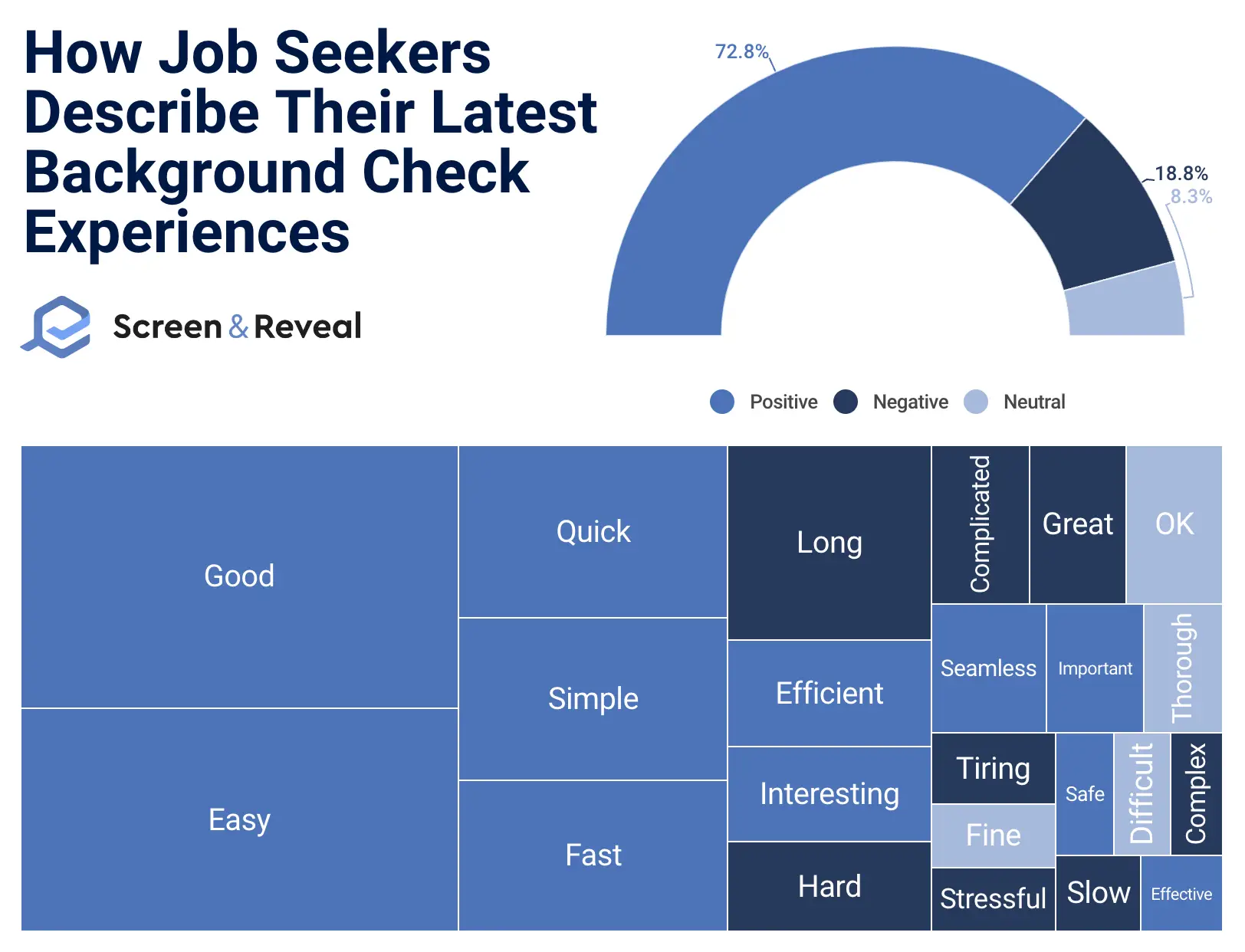
Background Check Facts & FAQs
18% of people have run a background check on their dates.
38% have researched a date online, and 29% admit they’ve spent over 20 minutes doing so. It is no surprise then, that Tinder now offers built-in background checks, in an attempt to reduce catfishing statistics and more severe incidents that can arise from matching the wrong person.
How far do most employers go for background checks?
While there are exceptions to this rule depending on the position and data needed, background checks usually go as far as seven years.
What shows up on a typical background check?
The results of a noncriminal justice background check include the full record in 43 US states and DC. 22 states report over one-year-old arrests without depositions, 17 report convictions only, 11 report juvenile records, and seven states report other information.
What is the longest time that a background check can take?
Background checks usually take anywhere between three days and a week. FBI background checks, however, can take up to 30 days.
How much does a background check cost?
The average cost of a background check varies between $30 and $50. More thorough screenings, however, can cost more than $100.
Sources: FBI, Giffords, HR.com, IBIS World, IBIS World, OJP, Oxford Academic, Politico, Statista, Sterling, Thriving Center of Psychology, Tinder

